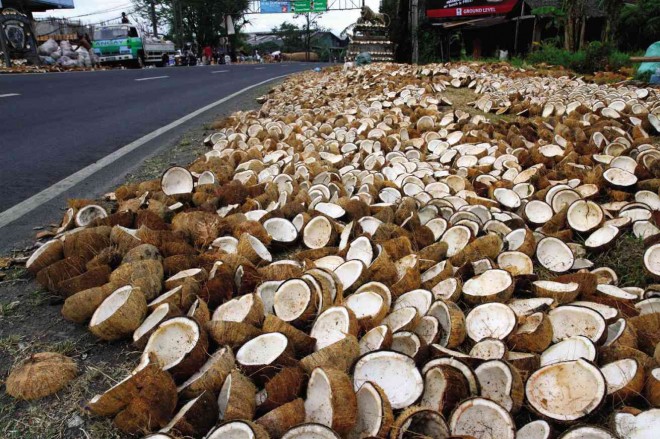Gov’t OKs organic spray vs coco pest

COCONUTS, the top agricultural product of Quezon province, are left to dry along Maharlika Highway in Lucena City. Fears that coconut meat and water will be contaminated with chemical pesticide against “cocolisap” arose after the government decided to use neocotinoids against the pest. DELFIN T. MALLARI JR./INQUIRER SOUTHERN LUZON
SAN PEDRO CITY, Philippines—The Fertilizer and Pesticides Authority (FPA) has approved for distribution an organic spray being eyed to thwart the outbreak of coconut scale insects (CSI), locally referred to as “cocolisap” infestation.
This came amid plans by the Philippine Coconut Authority (PCA) to use a new approach—insecticide trunk injection—to combat the pests that have so far affected at least 2.1 million coconut trees, mostly in the Calabarzon (Cavite, Laguna, Batangas, Rizal, Quezon).
The use of the insecticide, called neocotinoids, however, has alarmed Greenpeace Philippines and a local coconut farmers’ group in Quezon province, although government scientists found direct injection a quicker measure against the outbreak.
In a phone interview on Tuesday, Karen Herrera-Ramos, brand manager of Sinochem Crop Protection Phils. Inc. made known the company’s plan to launch CropGuard, initially for farmers in Batangas province in July.
This, she said, was after the FPA on June 4 approved the use of CropGuard, so far the only organic spray against the pests, following a series of tests in Calabarzon and Basilan areas.
Article continues after this advertisementCropGuard was developed by a local company, ChemRez Technologies Inc., led by
Article continues after this advertisementthe late entomologist Jose Calderon from the University of the Philippines Los Baños, as an “insecticide enhancer.”
What guarantees the safe use of CropGuard, Ramos said, is that it is 100-percent organic-based and biodegradable as it is made from edible plant sources. Once applied, the oil spray “melts down” the wax that covers the scales and eventually kills the insects. CSI (Aspidiotus rigidus) is a species whose soft body is protected by a scale or armor.